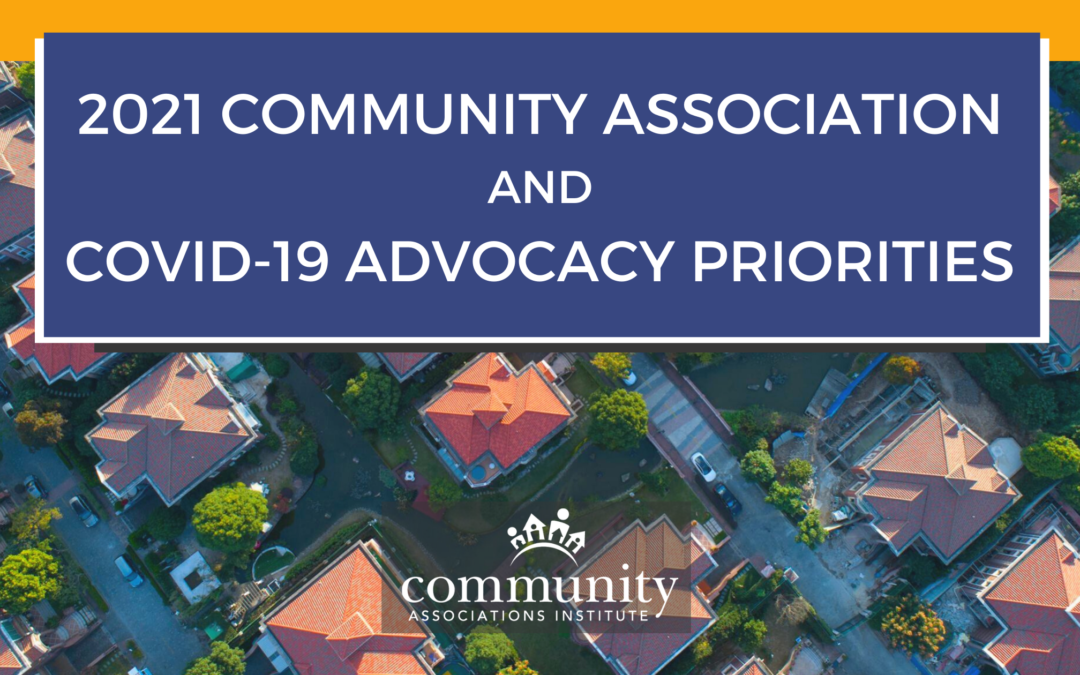All 50 U.S. state legislatures will be in session this year. With the majority convening in January and adjourning by the end of May—30 states have sessions lasting less than 120 days— it is likely that most will spend much of their time at first considering COVID-19-related legislation that will aid in recovery efforts. Furthermore, some legislative sessions will be held virtually while others will have strict safety protocols and limited access to state houses by legislators, lobbyists, and constituents.
CAI will monitor and advocate for legislation that impacts community associations across the country. Here is a summary of COVID-19-related advocacy priorities. Stay tuned next week for a second post detailing non-COVID-19-related and federal legislative priorities in 2021.
Emergency powers. CAI supports legislation that allows community associations to have emergency powers during states of emergency. Many boards of directors were uncertain of their authority to govern when the pandemic began. Legislation should provide boards of directors the limited authority they need to continue to manage association affairs of the associations during a state of emergency.
CAI developed language for state legislators to use when amending their current laws to include these emergency powers:
- Association emergency powers model language
- American Bar Association’s Model Nonprofit Corporation Act Emergency Powers Section
Housing security—housing assistance fund and lien priority. CAI supports relief funds for homeowners to pay their community association assessments from state housing finance agencies. The U.S. Department of the Treasury provides funds to states to cover residents’ mortgage payments, rent payments, and utilities. CAI urges states to allow the funds to be used to pay assessments. Now more than ever, it is important that community associations preserve lien priority to balance housing security and economic recovery.
Here are some additional resources related to housing security and lien priority:
- Current legislative tracking for COVID-19 housing finance funds
- States with a priority lien statute
- Current legislative tracking of priority lien for collecting delinquent assessments
- Contact the Government and Public Affairs team (government@caionline.org) for a state-specific email template to send to your state’s housing finance agency.
Limited liability protections. CAI supports legislation that limits a community association’s exposure to liability when acting in good faith and complying with local, state, and CDC guidelines when opening community facilities and governing operations.
Eleven states passed legislation in 2020 that provides limited liability protections to community associations: Georgia, Iowa, Kansas, Michigan, Mississippi, Nevada, North Carolina, Ohio, Oklahoma, Tennessee, and Utah. CAI’s legislative action committees will continue to pursue liability protections in states without existing laws.
At the federal level, liability protection legislation that would apply to all community associations also was introduced during the 116th congressional session (S. 4317). CAI will support its reintroduction.
CAI developed two versions of limited liability model language. We encourage our advocates to make this one of their COVID-19 advocacy priorities and work with their lobbyists and legislators to ensure community associations are covered.
- States with limited liability statutes
- Limited liability model language
- Current legislative tracking of COVID-19 limited liability bills
Virtual meetings: CAI supports legislation that allows a community association board or annual meeting to be held virtually. Virtual meeting rules and regulations vary from state to state and often are contingent on an association’s governing documents. Many states require associations to follow a nonprofit or business corporation act. If governing documents are silent on virtual meeting regulations, the nonprofit or business corporation act may allow an association to hold them.
A few states permit associations to conduct meetings electronically. In some cases, the association is only allowed to do so during a declared state of emergency. States that do allow some form of virtual meetings include California, Delaware, Indiana, Ohio, Oregon, and Washington state.
During the pandemic, several other states allowed associations to hold virtual meetings during a specific time period. These include Connecticut, Massachusetts, New York, North Carolina, and Virginia. CAI supports an option for community associations to hold meetings virtually during and following the pandemic.
Electronic voting. CAI supports legislation that allows community associations to use electronic voting for elections. Electronic voting, if conducted properly, can increase engagement, save money, and provide a practical solution to in-person voting while keeping residents safe, such as during the COVID-19 pandemic.
- Current state virtual meetings rules and statutes governing electronic voting
- Current legislative tracking of electronic voting and virtual meetings
To read more about CAI’s COVID-19 advocacy priorities, click here.



